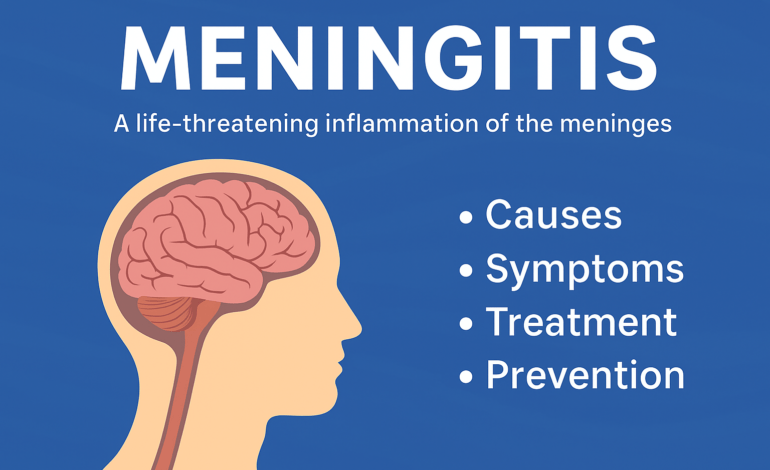
Meningitis: A life-threatening inflammation of the meninges
By: Dr. Avi Verma
Meningitis is a serious medical emergency caused by the inflammation of the protective membranes — known as meninges — that surround the brain and spinal cord. This inflammation is most often triggered by infections from bacteria, viruses, fungi, or, in rare cases, parasites or non-infectious causes. Without prompt treatment, meningitis can lead to severe complications such as brain damage, hearing loss, or death. Early recognition and immediate medical care are critical for survival and recovery.
Types of meningitis
1. Bacterial meningitis
This is the most severe and life-threatening form of meningitis. It progresses rapidly and demands urgent medical attention.
Common causative bacteria:
- Neisseria meningitidis (Meningococcal meningitis)
- Streptococcus pneumoniae (Pneumococcal meningitis)
- Haemophilus influenzae type b (Hib)
Bacterial meningitis requires immediate intravenous (IV) antibiotic therapy and often corticosteroids (like dexamethasone) to reduce inflammation and prevent neurological damage.
2. Viral meningitis
Viral meningitis is relatively common but usually less severe than the bacterial form.
Common viral agents:
- Enteroviruses
- Herpes simplex virus (HSV)
- Mumps virus
Treatment is primarily supportive care — rest, hydration, and medications to control fever and pain. Most cases resolve within 7–10 days, though hospitalization may be required for monitoring.
3. Fungal meningitis
This rare type typically affects immunocompromised individuals, such as those living with HIV/AIDS, undergoing chemotherapy, or on long-term immunosuppressants.
Common organisms:
- Cryptococcus neoformans
- Candida species
Treatment includes antifungal medications such as Amphotericin B and Fluconazole, often for extended periods.
4. Parasitic or non-infectious meningitis
In rare cases, meningitis may result from parasitic infections, autoimmune disorders, adverse drug reactions, or certain cancers. These cases require specialized investigation and treatment based on the underlying cause.
Symptoms to watch for
In adults:
- Severe, persistent headache
- High fever and chills
- Stiff neck
- Nausea and vomiting
- Sensitivity to light (photophobia)
- Altered mental status or confusion
In infants:
- Poor feeding
- Irritability or lethargy
- Bulging of the soft spot (fontanelle)
- Seizures
The classic triad — fever, neck stiffness, and altered consciousness — strongly suggests meningitis and warrants immediate emergency care.
Diagnosis
The gold standard for diagnosing meningitis is a lumbar puncture (spinal tap), which involves analyzing the cerebrospinal fluid (CSF) for:
- Elevated white blood cell (WBC) count
- Increased protein levels
- Decreased glucose (especially in bacterial meningitis)
Additional tests may include:
- Blood cultures to identify the infecting organism
- CT or MRI scans before lumbar puncture if increased intracranial pressure (ICP) is suspected
Reatment
1. Bacterial meningitis
- Immediate IV antibiotics — broad-spectrum initially, then targeted after lab results
- Corticosteroids (e.g., dexamethasone) to minimize inflammation and prevent hearing loss
2. Viral meningitis
- Supportive care: fluids, rest, and fever management
- Antivirals (such as acyclovir) if herpes simplex virus is the cause
3. Fungal meningitis
- Antifungal therapy with Amphotericin B, Fluconazole, or related drugs
Prevention is key
Vaccination:
- Hib vaccine (Haemophilus influenzae type b)
- Meningococcal vaccine
- Pneumococcal vaccine
These vaccines are highly effective and recommended for children, adolescents, travelers, and individuals with weakened immune systems.
Public health measures:
- Early detection and treatment of infections
- Prompt medical evaluation for symptoms
- Prophylactic antibiotics (e.g., Rifampicin) for close contacts of confirmed meningococcal cases
Meningitis remains a potentially fatal but preventable disease. Awareness, vaccination, and timely medical intervention can dramatically reduce the risk of serious outcomes. Never ignore sudden symptoms like fever with neck stiffness or confusion—immediate medical attention can be lifesaving.
Disclaimer:
This article is for informational and educational purposes only. It is not a substitute for professional medical advice, diagnosis, or treatment. If you or someone you know experiences symptoms of meningitis, seek immediate medical attention from a qualified healthcare provider.